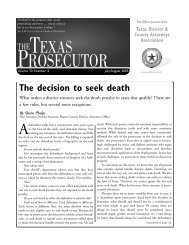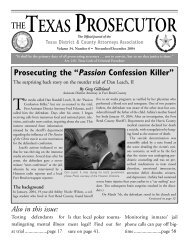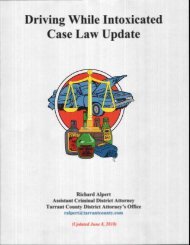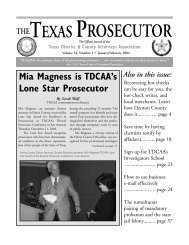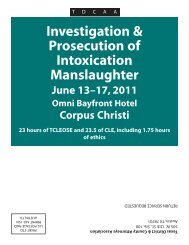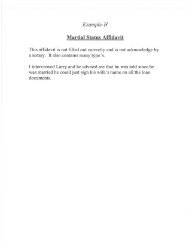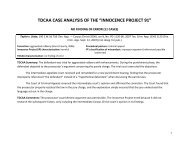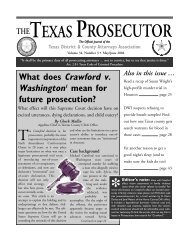Driving While Intoxicated Case Law Update - Texas District ...
Driving While Intoxicated Case Law Update - Texas District ...
Driving While Intoxicated Case Law Update - Texas District ...
Create successful ePaper yourself
Turn your PDF publications into a flip-book with our unique Google optimized e-Paper software.
J. COLLATERAL ESTOPPEL BARS INTOXICATION MANSLAUGHTER TRIAL ON<br />
DIFFERENT INTOXICANT<br />
Ex Parte Taylor, 101 S.W.3d 434 (Tex.Crim.App.2002).<br />
After being acquitted of lntoxication Manslaughter where the theory of intoxication alleged was<br />
alcohol, the State tried to proceed on another case, different victim, and now adding marijuana as<br />
a possrble source of intoxication. Collateral Estoppel barred.State from relitigating ultimate issue<br />
of intoxication, regardless of whether Sfafe alleged different type of intoxicant.<br />
K. NO DOUBLE JEOPARDY WHERE FAULTY UNDERLYING DWl PRIOR<br />
ALLEGATION DENIES COURT JURISDICTION<br />
Gallemore v. State, 312 S.W.3d 156 (Tex.App.-Fort Worth 2010).<br />
After an open plea of guitty to fetony DWI and at a tater punishment hearing, the defense pointed<br />
out that one of the underlying DWI's that was alleged to make the charge a felony was a subseguenf<br />
not a previous conviction. The defense asked to be sentenced for the misdemeanor DWl. The<br />
Court instead granted a mistrial after stating it had no jurisdiction in the case. The State then reindicted<br />
and replaced the defective prior with a good one. The defense filed a writ stating that<br />
double jeopardy had attached in the former proceeding. The Court of Appeals held that double<br />
jeopardy principles do not forbid multiple trials of a single criminal charge if the first trial resulted in<br />
a mistrial that (1) was justified under the manifesf necessify doctrine; or (2) was requested or<br />
consented to by the defense, absent prosecutorial misconductwhich forced the mistrial. Ihis case<br />
fell under "manifest necessity" because the trial court did not have jurisdiction.<br />
XXVI. PUTTING DEFENDANT BEHIND THE WHEEL<br />
A. DEFENDANT STATEMENT THAT HE WAS DRIVER = SUFFICIENTLY<br />
CORROBORATED<br />
Nieschwietz v. State, 2006 WL 1684739 (Tex.App.-San Antonio 2006, pet. ref'd).<br />
In this case, the defendant challenged the sufficiency of the evidence to establish that he was<br />
drivinq on a public highway while intoxicated, because his extrajudicial confessio n on the videOtape<br />
(that he was making a turn when the other car hit him) was not conoborated by other evidence. The<br />
Court found that the defendant's admission in the videotape that he was driving the vehicle was<br />
sufficiently corroborated by his presence atthe scene, the vehicle insurance documents listing him<br />
as owner of the vehicle, and the officer's opinion based on his investigation that defendantwasthe<br />
driver.<br />
Frye v. State,2004 WL 292660 (Tex.App.-Dallas 2004, no pet.) (Not designated for publication).<br />
Trooper who was dispatched fo scene of accident saw defendant leaning against bed of pickup<br />
truck. Asked if he was okay, the defendant replied he was "going too fast to negotiate the corner<br />
and he wrecked the vehicle." He did not say how long he had been at the scene. He'appeared<br />
intoxicated and admitted to having had some beers while he was fishing earlier that day. No fishing<br />
1"48



